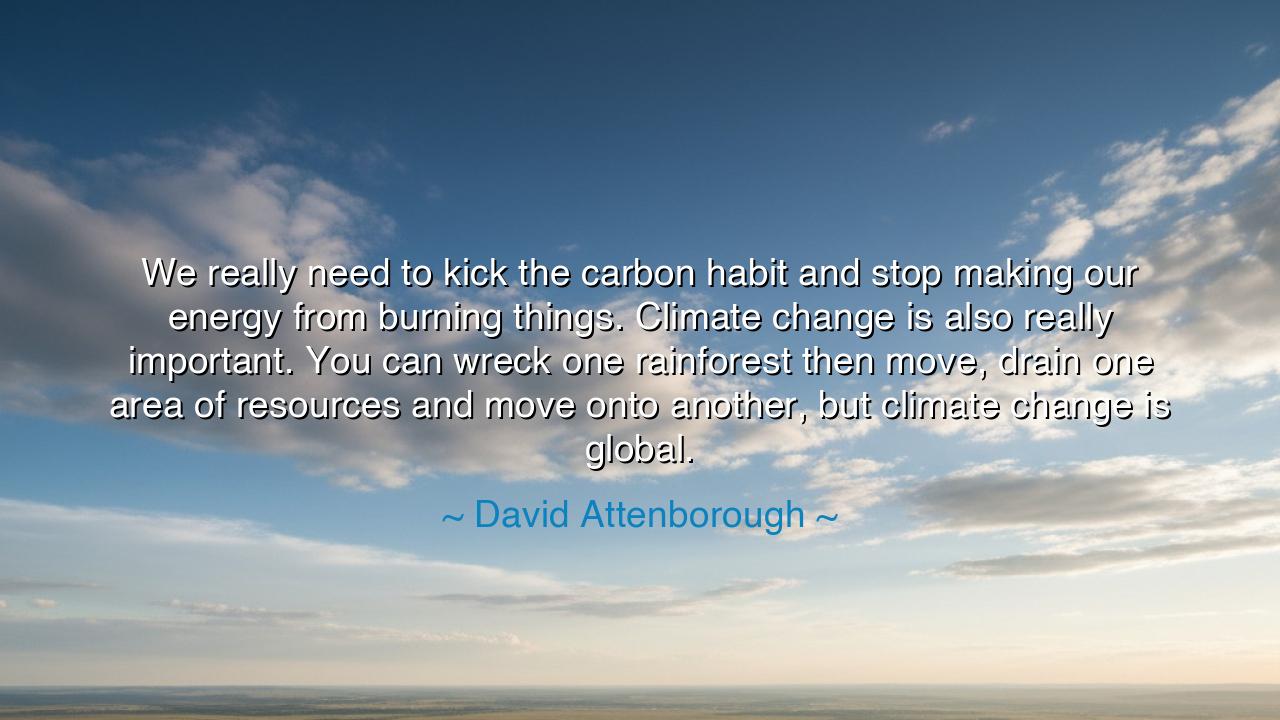
We really need to kick the carbon habit and stop making our
We really need to kick the carbon habit and stop making our energy from burning things. Climate change is also really important. You can wreck one rainforest then move, drain one area of resources and move onto another, but climate change is global.






Host: The room is quiet, the soft glow of the lamp casting a peaceful light across the space. Outside, the world is still, the last traces of daylight fading as evening takes over. Jeeny sits on the couch, a cup of tea resting on the table in front of her, her gaze distant but thoughtful. Jack, standing near the window, watches the darkening world outside, clearly deep in thought. The calm atmosphere invites deeper conversation, like a moment of reflection is about to unfold.
Jeeny: “Jack, I came across a quote from David Attenborough today that really stuck with me,” she says softly. “He said, ‘We really need to kick the carbon habit and stop making our energy from burning things. Climate change is also really important. You can wreck one rainforest then move, drain one area of resources and move onto another, but climate change is global.’ What do you think about that?”
Jack: He turns, a thoughtful expression crossing his face. “That’s such a powerful statement. It’s almost like he’s saying that carbon emissions and resource depletion aren’t just local issues — they’re part of a much bigger, global problem. The idea of climate change being a global force, something that affects the entire planet, really shifts how we see things. It’s not just about one rainforest, one area of resources; it’s about everything.”
Jeeny: “Exactly. What I think he’s really driving at is the interconnectedness of everything. We can’t keep acting as if environmental damage in one area doesn’t affect the rest of the world. Climate change doesn’t recognize borders or localities; it’s a global problem that requires global action. The idea of kicking the carbon habit is central to that — if we keep relying on fossil fuels, we’re only digging a deeper hole for the planet.”
Host: The light in the room deepens, as though the conversation has shifted to something more profound. Jeeny speaks with a quiet urgency, recognizing that the environment and climate change aren’t just abstract concepts, but urgent issues that demand collective action. Jack stands still, reflecting on how local actions have ripple effects that contribute to a much larger global crisis.
Jack: “I think I see it now. Attenborough is saying that we can’t afford to think of climate issues in isolation. Every action — whether it’s cutting down a rainforest or drilling for oil — impacts the bigger picture. And the carbon we release into the atmosphere isn’t just a local issue; it’s something that affects everyone, everywhere. We’re all connected in this fight against climate change.”
Jeeny: “Exactly. And the problem is that for so long, people have been able to shift the burden. Drill for oil here, deforest there, and move on. But now, the consequences of those actions are coming back to haunt us on a global scale. Climate change is not something we can escape by moving on to the next area — it’s something that’s affecting the entire planet. And until we act collectively, we won’t be able to stop it.”
Host: The room seems quieter now, the weight of their conversation sinking in. The idea that the actions of one part of the world ripple through to affect the whole feels profound, as if a deeper truth has been uncovered about the urgency of climate action. Jeeny and Jack reflect on the fact that climate change is not a local issue, but a global crisis that needs to be addressed with collective action, before it’s too late.
Jack: “So, the key is responsibility — we can’t just keep treating climate change as something that’s happening over there, or in someone else’s backyard. We need to start thinking of the planet as one whole system, where every action impacts the rest. We’ve all got a role to play.”
Jeeny: “Exactly. It’s about global accountability and realizing that we can’t keep exploiting resources without consequences. The future of our planet depends on how we treat it today. And that means making a commitment to sustainable energy and respecting the earth’s resources, because the stakes are much higher now than they ever were before.”
Host: The quiet of the room deepens, as if the conversation has landed in a place of shared understanding. The message is clear: climate change is a global issue, one that affects everyone, and it’s time to stop thinking of the world in isolated parts. The consequences of carbon emissions and resource depletion are not confined to one place — they’re a shared responsibility. And only by acting together, with urgency and commitment, can we hope to address the damage we’ve already done.






AAdministratorAdministrator
Welcome, honored guests. Please leave a comment, we will respond soon